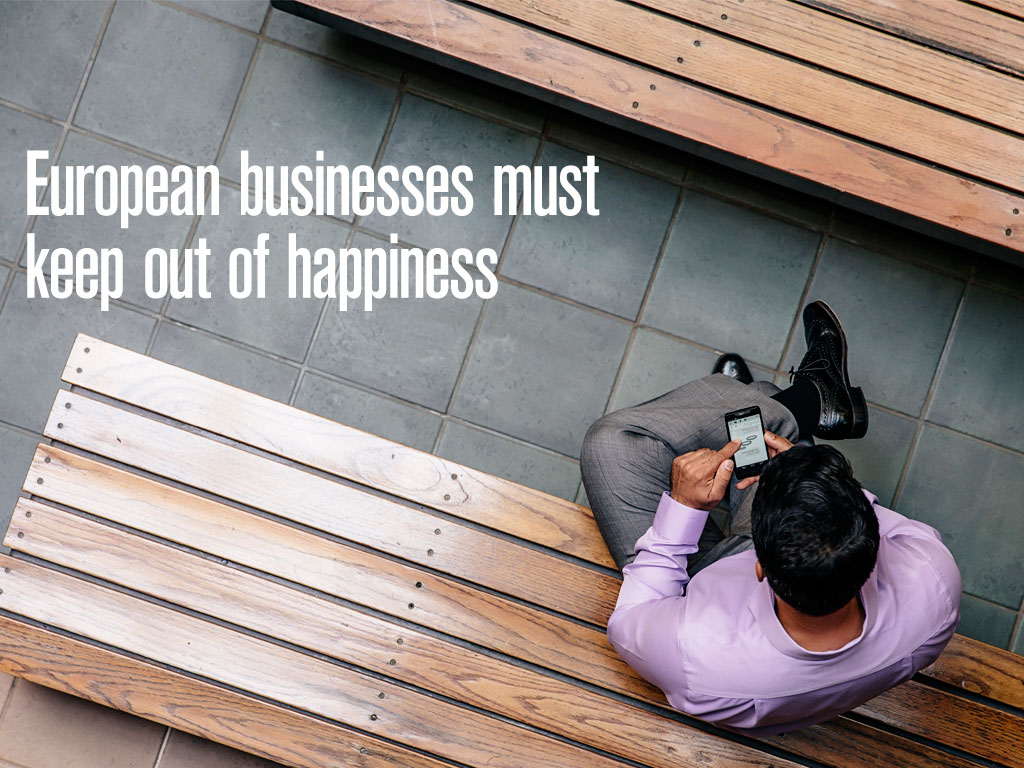

When the Founding Fathers of the US declared the independence of the 13 colonies, the citizens of their new state enjoyed the right to “Life, Liberty and the Pursuit of Happiness”. Drawing on the traditions of the Enlightenment, they intended to restrain the overbearing state, allowing autonomous individuals to pursue their own lives how they saw fit and pursue their own “happiness.”
Two and half centuries later, other countries and a score of institutions across the western world (and a few beyond) are also concerned with the happiness of people. Governments have launched national happiness surveys, statesmen of beleaguered economies speculate on the benefits of measuring happiness before tangible prosperity, while some economists seem to find studying the emotional states of consumers more interesting than questions of productivity or financial markets. Universities are also increasingly offering courses related to “emotional intelligence,” while student unions concern themselves with the happiness and “wellbeing” of students, alongside their traditional role as purveyors of cheap pints and protest marches. As Ashley Frawley argues in The Semiotics of Happiness, happiness has increasingly been recast as a social problem rather than a personal emotion.
This modern obsession with happiness, however, is far from an extension of the progressive Enlightenment ideals embodied in the founding documents of the US
From right to duty
This modern obsession with happiness, however, is far from an extension of the progressive Enlightenment ideals embodied in the founding documents of the US. Instead, it has been reconfigured as something that must be achieved by citizens, through the help – nay, interference – of interested parties. Happiness has become a duty; all other emotional states are unacceptable. Whereas the “pursuit of happiness” reduced intrusion by institutions into people’s lives, the new duty to be happy mandates such an intrusion.
In the US, one of the most recent developments of this modern obsession is its extension to the workplace. Employers are increasingly concerned with the happiness of their employees, shown through the development of roles such as ‘chief happiness officers’ and initiatives such as the Happy Business Survey. As the New Republic explains, “CHOs busy themselves with diagnosing the emotional wellbeing of their workers, as well as adjusting workplace policy and culture in order to create the conditions for happiness,” pinpointing the beginning of this role with Google’s Chade-Meng Tan, who functions as the internet giant’s Chief Happiness Officer under the title “Jolly Good Fellow.” Other supposedly forward-looking firms have followed suit.
Concern with employee contentment is, of course, nothing new. In the 19th century Robert Owen, the early utopian socialist and industrialist, attempted to cultivate an improved environment for his workers at his New Lanark Mill. Likewise, in the 20th century Henry Ford hoped to keep those he employed in his factories both happy and immune from the radicalism of the labour movement through certain material benefits, namely increased wages and access to good housing. The latest obsession with happiness by some American employers, however, is something entirely different.
For entrepreneurs like Owen and Ford, it was recognised that poor conditions or pay could have a negative impact upon an employee’s ability or willingness to work. Employers were unhappy due to poverty or other material factors, which could be addressed by the increased provision of material goods, whether in the form of wages or access to certain comforts. Yet they made no attempt to guarantee the happiness of their employees, but rather provided the basic means of workers to build upon – or not – for themselves.
Blurring work and private life
The new obsession with happiness concerns itself with the mental state of employees. This is infinitely more intrusive; the task of the chief happiness officer is to not only determine the innermost feelings of his or her workforce, but also devise some buzz-word ridden scheme in an attempt to redress it. They are mandated with altering an employee’s emotional state to one in which they – or the company – see fit.
But of course how happy one is, or isn’t, is not confined to work. An employee may be perfectly content with their job yet have a miserable home life. Alternatively, someone may detest the work they do, yet find their solace outside of their nine to five hours, drawing happiness and enjoyment from whatever extracurricular activities they may do.
A chief happiness officer would be tasked with – in their eyes – remedying the situation of the above counterpoised employees. The worker who enjoys his toil yet is miserable at home would be subject to some attempt to raise his “emotional wellbeing”. As noble as this may sound, it would be – unless invited – an intrusion into their private life, beyond the realm of work. Whatever the source of the employee’s misery outside of work, for it to be the official remit of an employer to address represents a creeping transgression into the former’s private life.
People’s emotional states are subject to a number of factors that float between the sphere of work life and private life. The remit of a chief happiness officer inevitably invites him or her to cross over such boundaries. With happiness as their concern, and the state derived from both private life and work life, the chief happiness officer’s intrusion into the former can only be expected.
Assuming the person in question is performing what is required by the employer to an adequate level, it raises the issue of what right this officer has to address their emotional state unsolicited. If the unhappy worker just treats their job as a means to an end (such as money, to find happiness in other pursuits) and performs their tasks adequately, attempts to change that represent an overbearing obsession with the employee’s internal thoughts. The employee may be unhappy at work, yet happy with other aspects of his or her life; work is just a route to achieving or sustaining sources of happiness in their free time – that, however, would be unacceptable to the joyful jobsworths.
“Rooted in science”
Spurious management roles not being enough, there also exists a sort of happiness consulting service. Delivering Happiness was founded by Jenn Lim, who is both the CEO and CHO of the company, and Tony Hsieh, the CEO of Zappos.com. The firm purports to provide “a snapshot” of the happiness levels of companies through their Happy Business Index, modelled on Nick Marks’s Happy Planet Index, which Lim claims is “rooted in science.”
This relies upon the assumption that happiness is some sort of quantifiable phenomenon. Yet happiness is something entirely subjective. Asked to grade their “happiness with X”, one respondent to a happiness survey would mark a seven, while another marks a nine. What the difference between a happy rating of seven and nine is remains unclear; the margin between two points on any scale claiming to measure happiness, a mystery.
On one level, it is a fleeting emotion. A flurry of joy one moment can give way to misery in another. On another level it is perhaps an overall state of mind, prone to ups and downs; the idea that one can be overall happy with their life. Yet trying to untangle the two, and the ups and downs of the latter – which happiness surveys seem to think they can do – seems entirely impossible. Uncertain is how the survey is supposed to know if the respondent is in a particularly happy or miserable mood on the day of questioning. Neuroscientists tell us that monetary happiness can result from chemicals such as dopamine after activities as simple as eating a chocolate bar. Presumably an employer who has had their happiness “mapped” through a survey shortly after enjoying a Twix is more likely to provide the survey with a happier “snapshot”.
While many institutions – from student unions to the higher reaches of government – have succumbed to this modern fixation with happiness, in Europe, businesses have so far resisted it. European business leaders would do well to continue to do so, keeping any self-purported happiness guru at bay. The fad is a seemingly incoherent attempt to slap the gold standard of science onto measuring what are essentially fluctuating emotions, amounting to an unhappy waste of money. In his Perpetual Euphoria: On the Duty to Be Happy, Pascal Bruckner writes: “We are not the masters of the sources of happiness; they ever elude the appointments we make with them, springing up when we least expect them and fleeing when we would hold them close… We have the power to avoid or to heal certain evils, yes, but we cannot order happiness as if it were a meal in a restaurant.”
Attempts to institute happiness in the workplace through “snapshot surveys” or the creation of management roles dedicated to this also degrade the relationship between employee and employer, with the latter being told the former has a right to attempt to tinker with their life. This overreach blurs the line between an employer’s private life and work, giving the company a tinge of the mid 20th century dystopian novel about it, and all the associated literary clichés.

